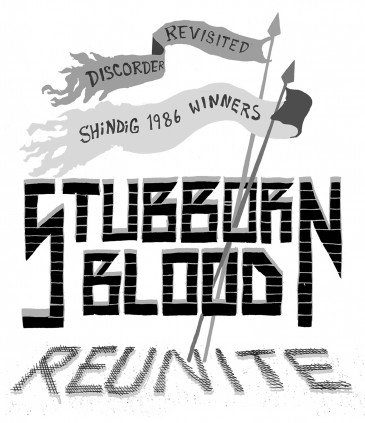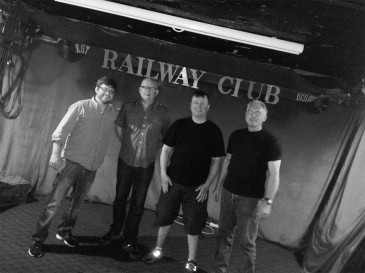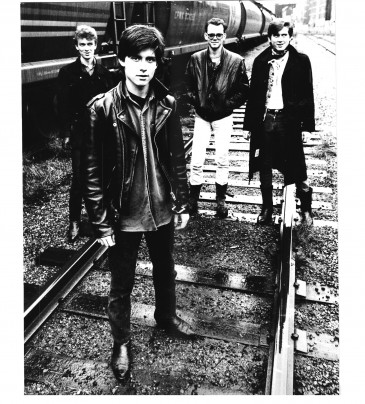
If I may, I’d like to take you all on a trip back to 1986: Vancouver has just turned the ripe age of 100-years-old, the Lower Mainland is a-scrambling to prepare for the upcoming Expo ’86, and folks over at CiTR had just put a wrap on their third-ever SHiNDiG competition, crowning local rockers Stubborn Blood as the best up-and-coming alternative band in Vancouver. Everything’s looking up for everyone.
“When we were asked about playing SHiNDiG, we had two questions,” singer/guitarist Dan “Danger” Campbell recalls to me over a few pints at Hops Pub in New Westminster. “’How much do we get paid and what’s the guest list situation like?’”
It’s okay if the name Stubborn Blood doesn’t stimulate any memory muscles. Despite winning SHiNDiG 27 years ago and enjoying the successes that came with it, the group was never able to make that leap from local favourites to mainstream recognition. But that never stopped the musicians before; and now, after a 25-year hiatus, Stubborn Blood is reuniting for a show at the Railway Club on April 10.
The show has been about a year in the making. Peter Curtis, who also played guitar and sang vocals, explains over email how the event manifested. “Plans were being hatched for my high school reunion. Because playing in Stubborn Blood was such a big part of my high school experience, I started thinking about the band reuniting for a gig as well.” After a bit of back-and-forthing, the stage was set.

Curtis and Campbell were the forefathers of Stubborn Blood, with Darrell Stables (drums) and Clint Murray (bass) filling out the rest of the roster. The two founders met when they were 15 and 19, respectively; Campbell was already playing in a band when he was approached by another musician, Curtis, while in a bar in Gastown. “He saw something in me, and I saw something in him.” Campbell remembers quitting his band at the time and lugging all his equipment across the city to practice with Curtis for the first time. “I showed up and asked, ‘Where’s everyone else?’ and he said ‘It’s just me!’ and there he is with his crappy acoustic guitar.”
During Stubborn Blood’s heydays of the mid ’80s, the Vancouver music scene was bolstering, full of youthful bands driven by a “We can do it! We can take on the world!” mentality. Clubs in downtown Vancouver like the Town Pump, the Venue, the Arts Club Lounge, and the Commodore made sure there was always a stage to perform on, band lineups (like Hip Type and Pointed Sticks) were a revolving door of local musicians, and a group’s name changed on a monthly basis — though Stubborn Blood, for some unexplainable reason, managed to retain its title.
The name came from a sign Campbell saw in a hospital, informing how to remove stubborn blood stains. Curtis thought the name was too harsh, prompting them to drop the “stains” and just go with Stubborn Blood. “Everyone who could ever move our career forward told us to change our name,” Campbell says, with even Paul Westerberg of the Replacements telling them to go with something else. “Maybe it was innocence. Maybe it was stupidity. There was no good reason not to.”
While the Internet now reigns as the juggernaut of music distribution, spreading the word about a band wasn’t always as easy as signing with Bandcamp and getting Twitter. CiTR was, and still is, a launching pad for local musicians to gain a following and be a part of the community. “CiTR, it was like fresh air coming out of the radio,” Campbell recalls fondly. “When I heard those bands, I wanted to be a part of them … CiTR was the medium to hear music you wanted to hear — especially on Sunday night.”

Performing gigs like UBC frat parties also played a big part in drawing Stubborn Blood to CiTR. A show on Sunday night’s called Demo Listen gave their demo a healthy amount of radio play, with Stubborn Blood claiming the show’s number one spot for 22 weeks.
SHiNDiG ’86 was divided between two bars in Vancouver: the now extinct Savoy, and the Railway Club. “Back when we were in it, SHiNDiG gave Vancouver bands a boost in terms of local recognition and bookings,” says Curtis about the impact the showcase has on the local music scene. The main prizes for the winning band that year were 24 hours of recording time, which Stubborn Blood used to record a four-track demo at Mushroom Studios, and a music video with Shaw, which was shot, but was neither edited nor ever aired. Even now, Campbell is in disbelief that the top honour ended up going to Stubborn Blood. “We went to Round Two, then went to Round Three, then to the Finals. And then we won … I thought us winning was a fluke.” While the competition was tough, Campbell gives partial credit for their victory to performing at the end of the night. “Usually the last band played the best because everyone was so drunk.”
The reunion show on April 10 isn’t about kickstarting a comeback or making a quick million dollars; instead, Curtis is just glad to be doing the gig: “We hope to have a good time. We’re doing this to have fun and to indulge in a little nostalgia.” Campbell hopes to give people a taste of what music was like in Vancouver during the ’80s, even if the environment has changed since then. “If people wanted to know what it was like, this is what it was like.”
After enjoying mild success post-SHiNDiG, Campbell left the group and eventually formed the band Danger Company with Stables and Murray. The band played together for a few years, but other life commitments led the members to drift apart. Memories from the experience haven’t faded though. Campbell still believes to this day, “I’m a better person for having stood in front of a microphone, singing a song that you wrote in your bedroom from when you were 16.”

